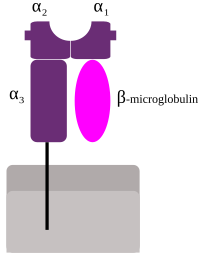 Global Information
Global InformationHuman leukocyte antigen information
| Human leukocyte antigen | |
|---|---|
 Schematic representation of MHC class I | |
| Identifiers | |
| Symbol | HLA |
| InterPro | IPR037055 |
| Membranome | 63 |

The human leukocyte antigen (HLA) system or complex of genes on chromosome 6 in humans which encode cell-surface proteins responsible for regulation of the immune system.[1] The HLA system is also known as the human version of the major histocompatibility complex (MHC) found in many animals.[2]
Mutations in HLA genes may be linked to autoimmune diseases such as type I diabetes, and celiac disease. The HLA gene complex resides on a 3 Mbp stretch within chromosome 6, p-arm at 21.3. HLA genes are highly polymorphic, which means that they have many different alleles, allowing them to fine-tune the adaptive immune system. The proteins encoded by certain genes are also known as antigens, as a result of their historic discovery as factors in organ transplants.[3]
HLAs corresponding to MHC class I (A, B, and C), all of which are the HLA Class1 group, present peptides from inside the cell. For example, if the cell is infected by a virus, the HLA system brings fragments of the virus to the surface of the cell so that the cell can be destroyed by the immune system. These peptides are produced from digested proteins that are broken down in the proteasomes. In general, these particular peptides are small polymers, of about 8-10 amino acids in length.[4] Foreign antigens presented by MHC class I attract T-lymphocytes called killer T-cells (also referred to as CD8-positive or cytotoxic T-cells) that destroy cells. Some new work has proposed that antigens longer than 10 amino acids, 11-14 amino acids, can be presented on MHC I, eliciting a cytotoxic T-cell response.[5] MHC class I proteins associate with β2-microglobulin, which, unlike the HLA proteins, is encoded by a gene on chromosome 15.
HLAs corresponding to MHC class II (DP, DM, DO, DQ, and DR) present antigens from outside of the cell to T-lymphocytes. These particular antigens stimulate multiplication of T-helper cells (also called CD4-positive T cells), which in turn stimulate antibody-producing B-cells to produce antibodies to that specific antigen. Self-antigens are suppressed by regulatory T cells. Predicting which (fragments of) antigens will be presented to the immune system by a certain HLA type is difficult, but the technology involved is improving.[6]
HLAs corresponding to MHC class III encode components of the complement system.
HLAs have other roles. They are important in disease defense. They are the major cause of organ transplant rejection. They may protect against cancers or fail to protect (if down-regulated by an infection).[7] HLA may also be related to people's perception of the odor of other people, and may be involved in mate selection, as at least one study found a lower-than-expected rate of HLA similarity between spouses in an isolated community.[8]
Aside from the genes encoding the six major antigen-presenting proteins, many other genes, many involved in immune function, are located on the HLA complex. Diversity of HLAs in the human population is one aspect of disease defense, and, as a result, the chance of two unrelated individuals with identical HLA molecules on all loci is extremely low. HLA genes have historically been identified as a result of the ability to successfully transplant organs between HLA-similar individuals.[9]
- ^ Choo SY (February 2007). "The HLA system: genetics, immunology, clinical testing, and clinical implications". Yonsei Medical Journal. 48 (1): 11–23. doi:10.3349/ymj.2007.48.1.11. PMC 2628004. PMID 17326240.
- ^ "Human leukocyte antigen (HLA)". MS Trust. December 2020. Retrieved 7 June 2021.
- ^ Nakamura T, Shirouzu T, Nakata K, Yoshimura N, Ushigome H (September 2019). "The Role of Major Histocompatibility Complex in Organ Transplantation- Donor Specific Anti-Major Histocompatibility Complex Antibodies Analysis Goes to the Next Stage". International Journal of Molecular Sciences. 20 (18): 4544. doi:10.3390/ijms20184544. PMC 6769817. PMID 31540289.
- ^ Matsumura M, Fremont DH, Peterson PA, Wilson IA (August 1992). "Emerging principles for the recognition of peptide antigens by MHC class I molecules". Science. 257 (5072): 927–34. Bibcode:1992Sci...257..927M. doi:10.1126/science.1323878. PMID 1323878.
- ^ Burrows SR, Rossjohn J, McCluskey J (January 2006). "Have we cut ourselves too short in mapping CTL epitopes?". Trends in Immunology. 27 (1): 11–6. doi:10.1016/j.it.2005.11.001. PMID 16297661.
- ^ Bouzid R, de Beijer MT, Luijten RJ, Bezstarosti K, Kessler AL, Bruno MJ, Peppelenbosch MP, Demmers JA, Buschow SI (May 2021). "Empirical Evaluation of the Use of Computational HLA Binding as an Early Filter to the Mass Spectrometry-Based Epitope Discovery Workflow". Cancers. 13 (10): 2307. doi:10.3390/cancers13102307. PMC 8150281. PMID 34065814.
- ^ Galbraith W, Wagner MC, Chao J, Abaza M, Ernst LA, Nederlof MA, et al. (1991). "Imaging cytometry by multiparameter fluorescence". Cytometry. 12 (7): 579–96. doi:10.1002/cyto.990120702. PMID 1782829.
- ^ Brennan PA, Kendrick KM (December 2006). "Mammalian social odours: attraction and individual recognition". Philosophical Transactions of the Royal Society of London. Series B, Biological Sciences. 361 (1476): 2061–78. doi:10.1098/rstb.2006.1931. PMC 1764843. PMID 17118924.
- ^ Singal DP, Mickey MR, Mittal KK, Terasaki PI (November 1968). "Serotyping for homotransplantation. XVII. Preliminary studies of HL-A subunits and alleles". Transplantation. 6 (8): 904–912. doi:10.1097/00007890-196811000-00005. PMID 5696819. S2CID 32428268.